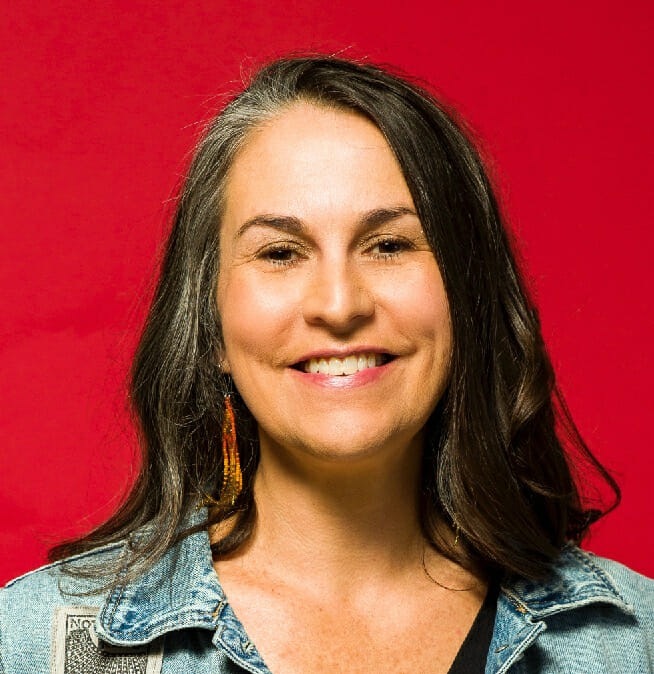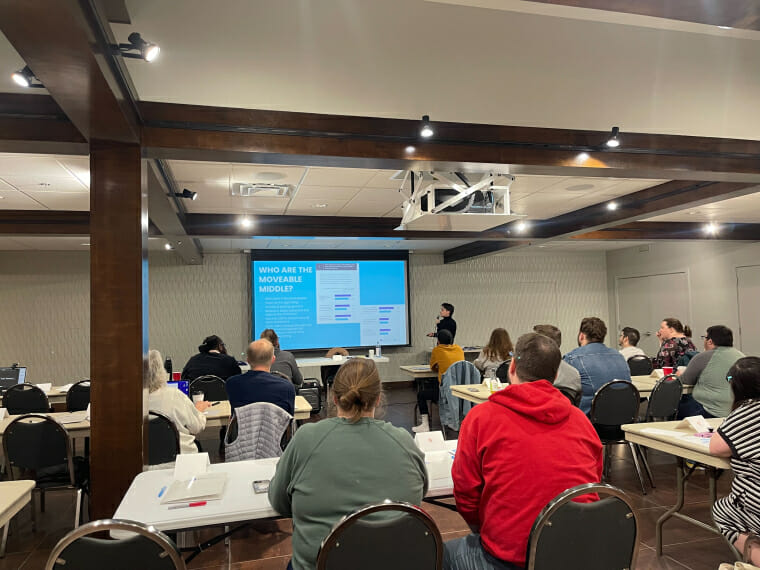Stacey Woolley was reelected on April 4 as a Tulsa Public School District One Board of Education member. The incumbent is an educator and mother of two young adults and three children enrolled in Tulsa Public School (TPS).
She was first elected in 2020. Then she was nominated to serve as Board President of the district. However, her initial run and re-election have had a particular focus on LGBTQ equality.
“I am very proud to have had the support of over 68% of voting Tulsans and hope that sends the message of love and acceptance to every single student in our district. Those of us in this conversation know just how critical feeling safe and having a sense of belonging is to creating safe schools, and I will do all I can to be certain every student, teacher, and staff member is included in that effort,” Woolley said in an email to GLAAD.
On March 10 Dakota Christian, Woolley’s campaign manager, attended the public non-partisan GLAAD Media Institute for our Engagement 101 media training “Telling Your Story: Messaging and Media Tools for Today’s Activist” hosted in partnership with Oklahomans for Equality.
GLAAD’s visit to train Tulsa, Oklahoma LGBTQ advocates, including our hosts at Oklahomans for Equality (@okeq) gets covered by local ABC affiliate station Channel 8, KTUL (@KTULnews). https://t.co/M0gz0rnE8c
— GLAAD (@glaad) March 28, 2023
There was less than a month left before election day, but Christian registered to fill one of the dozens of seats anyway.
Christian and other LGBTQ advocates from a variety of organizations practiced using effective storytelling and messaging to help audiences accelerate acceptance and strengthen LGBTQ equality throughout Tulsa and the state of Oklahoma
“Personally, I found the portion about remaining focused on your message, asking who your audience is, and what listeners take away to be very beneficial at the end of the campaign,” Christian said to GLAAD in an email.
The training, Christian shared, reinforced the strategy that he and Woolley campaign volunteers were executing. He wanted volunteers to think about how and why they were involved in getting Woolley reelected.

This question was to help motivate volunteers’ connections between messaging and identifying the audiences they were trying to reach.
“We had been communicating with canvassers about sharing their personal stories of not only why they were voting but also volunteering their weekend for Stacey,” Christian said.
The teacher, the mother and the TPS leader said that the election results “are a mandate from voters.”
Woolley ran on the belief that it’s necessary upon both the state and local level government to ensure that all students are empowered to reach their fullest potential through public instruction — and that when this potential is realized, students will become thriving and contributing members of the greater Tulsa community, according to her website.
With her elected position, Woolley holds an Oklahoma teaching certificate and works as a speech pathologist and dyslexia interventionist. She is an education advocate and served as PTA president. The Board president says on her website that her primary goal as a board member is to give a voice to the families of TPS.
The District One School Board representative also says this reelection means that LGBTQ students, staff members, and their families “have a voice on their Board of Education who will be a relentless advocate for their rights, safety, and dignity.”
“It means that these members of our community who are being viciously targeted by fear-mongering elected officials under the guise of ‘parents’ rights’ have a fierce and committed ally who will do everything in my power to protect them. Every child and every person has a God-given right to live fully in their truth and be safe, supported, and celebrated in their schools and classrooms. All too often, it seems people forget that we are souls with bodies and not vice versa. If we honor the soul, we have done right by humanity,” said Woolley.

Right now, Oklahoma faces more than 35 anti-LGBTQ bills advancing in the state legislature, according to ACLU’s anti-LGBTQ legislation tracker. About half of those bills target schools and education with a mission to prevent trans students from participating in school activities like sports, force teachers to out students, and censor any in-school discussions of LGBTQ people and issues. The other half target health care for transgender youth. These bills target access to medically-necessary health care, like Medicaid, for trans people. Most of the bills banning health care for trans youth can create criminal penalties for providing this care, as described by the ACLU. In addition, these bills exempt persecution towards identical treatments offered to cisgender youth or those forced onto intersex youth. Some other anti-trans health care bills block funding to medical centers that provide gender-affirming care, or block insurance coverage for trans health care.
In response to the anti-LGBTQ bills, The City of Tulsa reaffirmed Tulsa as a welcoming, compassionate, and inclusive city to all regardless of race, color, religion, sex, national origin, ancestry, marital status, familial status, sexual orientation, gender identity, gender expression, or disability
When Irrisa Baxter-Luper told GLAAD Media Institute Tulsa trainees how she responded to the inclusion resolution, she said, “It felt like a win.” Contrarily, when Baxter-Luper read the state’s local news coverage of the resolution, she said she was irritated. She took her feelings to the Tulsa World with an Op-Ed to enliven an angle she felt was missing from the story: Inclusion.
“It was an emotional night but one that proved to center LGBTQ+ voices,” said Irissa Baxter-Luper. https://t.co/85EdEArR1i
— Tulsa World Opinion (@TWOpinion) March 6, 2023
She told the room that the article’s framing did not represent what was happening in the room the night of the resolution’s passing, so she took action.
“I really sat down, and kind of thought through a different framing,” said the advocate. “It was the same information that was in the original article, but I tried to frame it to show how we all came together that night.”
Now, Baxter-Luper says that while there is work to be done with Tulsa local media, she is happy there are fearless leaders like Woolley who put inclusion first.
“With so many conversations about LGBTQ+ inclusion happening in public education, having a vocal and established Board President like Stacey Woolly, who doesn’t shy away from explicit inclusion, is vital.
“The way that she speaks about both LGBTQ+ equality and equality for other marginalized communities makes me hopeful for the future of this work in Tulsa,” Baxter-Luper said in an email to GLAAD.













